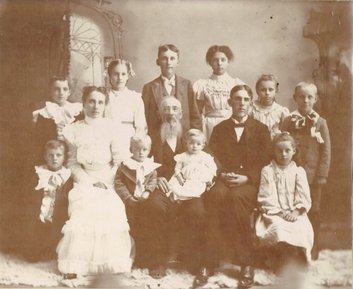HAUNTS & HAINTS

Photo Courtesy of Kathy Robinson
At the core of the world's major religions is the belief in the continuing existence of the soul following the physical body.
According to some Rootworkers, depending on their specific religion, human beings are comprised of the body, the soul, and the spirit. When a person dies, the body goes to the grave, the soul rest at peace and the spirit remains on Earth until it is reunited with the body on the day of Judgment.
Perhaps this is why the terms ghost and spirit have become virtually interchangeable. Simply stated, however, a Ghost is what a human-being becomes when he or she dies and their soul remains earthbound. These reasons commonly include.
Other terms synonymous with the term ghost include haunt, haint, duppy, and poltergeist.
Ghosts manifest in various forms. They may appear as balls or streaks of light, shadows, mist, and they sometimes, but not often, appear in full of partial human form. Those gifted with extrasensory abilities have reported being able to see, hear, and even feel the presence of ghosts. Other individual have reported being physically touched by ghosts.
Ghosts can be friendly or unfriendly, as evidenced by the four classifications of ghosts.
Many spiritual traditions have their own methods of helping a Ghost to move on, or of banishing a negative entity. Some of these methods include:
A relatively new method of banishing a ghost within the realm of Parapsychology, involves electron displacement. This school of thought theorizes that an electron flow is needed to keep a ghost on this plane and that by reversing the polarity of electrons in a given area, a resident ghost will lose its foothold on this plane of existence.
According to some Rootworkers, depending on their specific religion, human beings are comprised of the body, the soul, and the spirit. When a person dies, the body goes to the grave, the soul rest at peace and the spirit remains on Earth until it is reunited with the body on the day of Judgment.
Perhaps this is why the terms ghost and spirit have become virtually interchangeable. Simply stated, however, a Ghost is what a human-being becomes when he or she dies and their soul remains earthbound. These reasons commonly include.
- They have unfinished business, something that they feel needs to be completed before they can move on.
- They don't know that they are dead, from their perspective they are simply going about their business.
- They are Earth bound by a grieving loves one who refuses to let them move on.
Other terms synonymous with the term ghost include haunt, haint, duppy, and poltergeist.
Ghosts manifest in various forms. They may appear as balls or streaks of light, shadows, mist, and they sometimes, but not often, appear in full of partial human form. Those gifted with extrasensory abilities have reported being able to see, hear, and even feel the presence of ghosts. Other individual have reported being physically touched by ghosts.
Ghosts can be friendly or unfriendly, as evidenced by the four classifications of ghosts.
- The Guardian, which is not to be confused with a guardian-angel or familiar spirit, represent the 'friendly-ghost' archetype. They are always harmless, even protective of those in their environment and those who reside within it. Many people find it comforting to share their space with these entities.
- The Trickster may or may not be harmless, due to your temperament. Normally, the Trickster will not perform pranks which are deadly, just inconvenient, such as hiding your car keys or disabling your alarm clock, making you late for work. Some people are easily disturbed by these events, while others think it makes life more interesting and could not be bothered. Poltergeist (noisy-spirit) often fall into this category, however they can be abusers as well.
- The Abuser is always harmful, often violently so. They will often leave marks of their attack on their victim, such as claw or bite marks, bruises, etc... Abusers represent the worst kind of ghostly encounter, and they have been known to commit murder. There are various reasons for their attacks. The ghosts of those who died bad often seek revenge against those whom they perceive to have caused their demise. Alternately, they will target those who share qualities similar to the person they blame for their death. Other ghosts were simply bad in life and so continue their evil in the after-life.
- A Death-Echo is not considered a true ghost, they occur when a person' death is so traumatic that the event imprints itself onto the environment, much like recording a song from the radio onto a tape. When triggered by certain events or emotions, usually those similar to the original event, the Echo then replays itself, similar to a time loop.
Many spiritual traditions have their own methods of helping a Ghost to move on, or of banishing a negative entity. Some of these methods include:
- Acknowledging its presence, talking to it peacefully and convincing it to move on.
- A blessing is performed by religious clergy gently sending the ghost off the Earth plane; however, if this does not occur, then it is forcibly sent off the Earth plane with a banishing ritual or a series of rituals.
- A grieving person must be convinced that they are doing their loved one more harm than good by holding on too tightly, and that only be allowing the loved on to move on will each of them find peace.
A relatively new method of banishing a ghost within the realm of Parapsychology, involves electron displacement. This school of thought theorizes that an electron flow is needed to keep a ghost on this plane and that by reversing the polarity of electrons in a given area, a resident ghost will lose its foothold on this plane of existence.